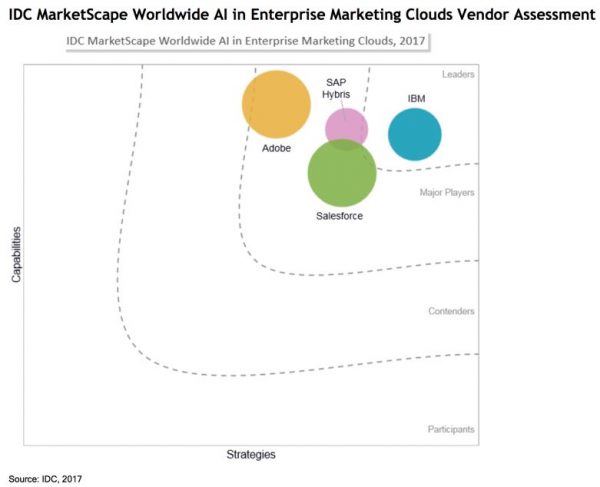Gerry Murray, Research Director at IDC, presented on the AI Powered Marketing Landscape in the cloud. He presented a “lay of the land” of AI-powered marketing providers in their first-ever MarketScape on Artificial Intelligence in Enterprise Marketing Clouds.
Gerry focuses on the Marketing Technology Research practice. He takes a use case approach which is great because the devil is in the details.
Quote: AI will completely change customer brand behavior
Quote: The most profound technologies are those that disappear. They weave themselves into the fabric of daily life.
The hierarchy of customer expectations drive you to take a holistic look at the experience. You can’t just focus on email communication for example. Customers want you to anticipate their needs. They want you to show them the, “next page in the story” no matter which channel they use.
Quote: The best CX sets the bar for all CX (Paul Pappas, IBM) This is true across all channels email, mobile, tv, video, events, web, etc.
Every interaction has to enhance every other interaction. That’s a really tough challenge. This drives an architecture towards orchestration services. In other words, it’s API driven so it can be used in all channels.

IDC invited all the vendors above along with several others. Google, Infor, Microsfot, Oracle, and SAS chose not to participate. Blackbaud and one other who were too niche. That left Adobe, SAP Hybris, Salesforce, and IBM.
IDC looked at 30 separate use cases but also took a look at other factors like:
- Use cases
- Services
- Project success services
- Change Management
- AI Model
- Model transparency
- Model training
- Model update frequency
You can find the report for IBM here.
The use case landscape for Marketing. It’s huge. There are a lot of user cases in four categories
- Interaction channels
- AI enabled recommendation engine
- Analytics
- Support
Where to start:
- Virtual sales rep
- chatbots
- cross-sell / upsell
- AI-powered merchandising
- recommendation engine
- social sentiment analysis
- lead scoring
- attribution analysis
- competitive intelligence
For each of the above, you need to know what you want, understand the complexity, and prioritize accordingly. Note: IBM Watson provides services for all of the above.
Chatbots: the narrower the swimlane, the more success you will have. The more general, the more challenges and time / data you need to invest.
The Restaurant
When you think about AI in Marketing, ti’s a little like an AI Powered Marketing Kitchen. You have all sorts of stuff. That includes multiple channels, lots of data sources, etc. You bring all this into the “kitchen” where you build recipe. Take the raw ingredients to create a dish. When you create a good dish, your customers like it. When you use the ingredients incorrectly, it ruins the meal.
Bad outcome: here’s your meal, enjoy. “But I’m allergic to shellfhish!”
In this case, you need a waiter to get the ideas and add value to the experience. AI can be the waiter here. But you have to be cognizant of the data and how good it is.
Who is your team? (cooks in the kitchen)
- Data Scientist
- Marketing Technologist
- Business Analyst
- Data Driven Marketer
Quote: Remember, customers expect more from Marketing than just “Marketing”
Action Plan
- Customer expect more
- Get going. You don’t want to be at the back of the pack
- Use well defined use case. This is the #1 key to success
- Focus on fit between use cases and data sources. If you don’t have the data, you can’t use the use case.

